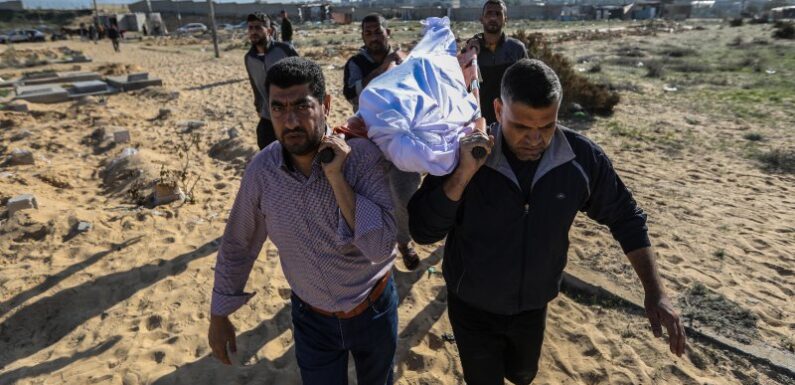
Save articles for later
Add articles to your saved list and come back to them any time.
Gaza Strip: He sits, unexpectedly, in front of an Israeli flag, his white hair and closely cropped beard set off by an equally unexpected half-smile.
“I am Yousef Mahmoud Hamad al-Mansi,” he says into the camera, adding that he’s a former minister of communication and housing for Hamas.
“They destroyed the Gaza Strip,” he says of current Hamas chief Yahya Sinwar and his lieutenants, the ones who launched the October 7 attack in which 1200 Israelis were killed, 240 were kidnapped and Israel was driven to carry out its deadly war in Gaza.
Relatives and friends attend the funeral of Muhammad Abdullah Hasaballah, 22, killed by air strikes in Khan Yunis, Gaza.Credit: Getty
“People in Gaza say that Sinwar and his group destroyed us – we must get rid of them.”
The 14-minute video, part of an Israeli-led propaganda campaign to discourage its enemy and boost its own people, was posted this week without elaboration by Israel’s Shin Bet security agency. Officials at that organisation say Mansi was arrested in Gaza on December 5.
While Mansi’s statements may have been coerced, there is reason to believe that Gazans are growing more disillusioned with Hamas – or more emboldened to criticise it – as Israel’s punishing war grinds through its tenth week. Such a shift in mood might not have an immediate impact, but if Israel’s military campaign were to end without a clear victory, civilians could feel empowered to rise against the Islamic group.
Since the war, life in Gaza – which was never easy – has become unbearable. And while most Palestinians are furious at Israel, some are also expressing anger at Hamas, which has ruled the strip since 2007, when it threw out the Palestinian Authority through a brief and violent civil war.
“Hand over the hostages and stop the war,” Rahaf Hneideq, a Gaza-based professor of Islamic studies, wrote to Hamas on Facebook. “Enough death, enough destruction. Stop the displacement. Don’t your people deserve that?”
The vast majority of the strip’s 2.2 million inhabitants have been displaced at least once since Israel’s invasion. More than 18,000 people, most of whom are women and children, have been killed, according to the Hamas-run Health Ministry. Entire neighbourhoods have been reduced to rubble in the Israeli attacks.
Humanitarian aid is also scarce and increasingly fought over. Many complaints about Hamas, which is considered a terrorist organisation by Australia, the US and European Union, have to do with its diverting or hoarding aid from the public.
“I saw Hamas police pushing people away, shooting in the air and then loading a lot of the aid into their own vehicles,” said Ali Abu Ouda, who fled with his family from the northern Gazan town of Beit Hanoun on three occasions before settling in the southern city of Rafah.
“We see trucks every day, some from Egypt, some from Qatar, some from Saudi Arabia, but we don’t see enough food distributed,” he said. “The government must stop this practice and needs to ensure fair distribution of aid to people who have been forced out of their homes into the unknown.”
While sheltering in a half-built shop in Rafah with her mother and three children, Khouloud Abu Baraka described her fear and frustration of ensuring that her family had enough to eat. “We were told this is our ration for a week,” she said by phone, describing a package that contained two cans of fava beans, a bottle of water and some bell peppers.
Baraka and others said that a black market for food and medicine has emerged, with prices soaring to rates five to ten times higher than normal. Meanwhile, these people said, Hamas authorities seem indifferent to the plight of the displaced. While abandoned homes are looted and Gazans subjected to relentless Israeli attacks, Sinwar and Hamas leaders remain hidden, perhaps deep in their network of tunnels.
Yahya Sinwar, head of Hamas in Gaza, centre.Credit: AP
In phone interviews, other Gazans said that while they were horrified by the level of destruction and what they consider the indiscriminate nature of the violence caused by the Israeli offensive, they are also quietly hoping it will destroy Hamas. In social media posts, some avoid mentioning the group by name, instead citing a Muslim prayer and then making a general call to stop the war or hand over the hostages.
Hamas had plenty of critics before the war, but they expressed themselves in whispers or by boarding rickety boats bound for Egypt or Turkey. Upset that the strip’s leadership looked after its followers far better than the rest of the population, Gazans in opinion polls showed growing disaffection with the group.
Now, however, that silence has been lifted and online forums are rife with videos of angry Palestinians lashing out at Hamas.
A woman who gave her name only as Sulaf Abu said that she had left her home in east Khan Younis and is now sheltering at a United Nations-run school. “May God avenge those who brought us to this situation,” she said. Asked whom she meant, she said, “All of them — Israel, Hamas, Sinwar, Arabs.”
Mohammad, who also declined to give his family name, was more philosophical. “The only solace we find is that this war may end Hamas’s rule,” he said. “If it ends, we will forget our pain during the war, but if the war ends and Hamas remains in power, this means more siege and more wars.”
Bloomberg
Most Viewed in World
From our partners
Source: Read Full Article

